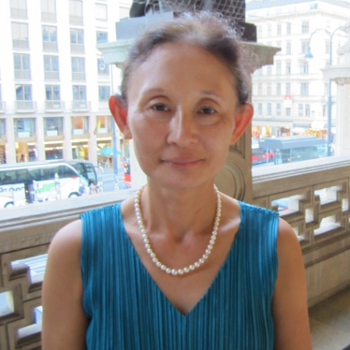As with many of his operas, Janáček’s Jenůfa is a story of common folk doing their best in their often difficult circumstances. A village girl under supervision by a strict stepmother gets pregnant by a handsome but weak-willed young man; her hope of marrying Števa is dashed when her cheek is slashed by his jealous half brother, Laca. Jenůfa’s baby, borne in secret, is then drowned by the stepmother who hopes to marry her off to the guilty brother. On their wedding day, the baby’s body is found, and amid the village mob’s singular accusation of the stepmother, Jenůfa forgives her, and she and Laca embark on a life together.
In a revival performance of Barbara Frey's Bavarian State Opera production charged with emotional tension, the heroine’s transformation from helpless victim to strong redeemer emerged most clearly thanks to a terrific reading of the score by the conductor Tomáš Hanus. From the distinct opening of xylophone depicting the turning of a windmill (in this modern production wind propellers one sees in the European countryside are projected on the back of stage), setting the tone of a moody daily grind of country life, the music flowed in a complex juxtaposition of folk music and symphonic melodies. Jenůfa’s gradual self-emancipation from oppression was seldom realized in such clear and careful details, by vivid strings, haunting horns and delicate harp. The final quiet moments felt as if the heaven had opened up for renewal of hope.
Eva-Maria Westbroek embodied Jenůfa in fine vocal and physical acting. Her voice, full of warm and rich color, was a perfect vehicle for the young woman full of goodness despite her hardship. Occasional spreading that crept into her high notes did not detract from her sympathetic and unassuming characterization as she was secure in her pitch. Karita Mattila’s Kostelnička was a force of nature as she used her penetrating voice to project the strict authority of a village matron. Her anguish in Act 2 and her admission of guilt in Act 3 were some of the finest vocal performances I have witnessed as her meticulous singing led the melodic contours of the score with precision and inevitability as the orchestra followed her closely behind.
But it was Stuart Skelton’s intense and intelligent performance that was most memorable of the evening. His voice had both weight and brilliance, a good vehicle to convey Laca’s frustration with his lot and his desperate longing for Jenůfa. As with Mattila, Skelton has the gift to follow and shade Janáček’s melodies with thrilling and natural ease. He dominated ensemble scenes with his dramatic and powerful voice. His cries of “Jenůfa!” were affecting and haunting.
Pavel Černoch was perfect as the good-looking but spineless Števa, and if his Act 1 singing was a little underpowered, his desperation in Act 2 as he was confronted by his strong stepmother was heartfelt and nuanced. Hanna Schwarz was a strong presence as the grandmother even when she was silent for a long stretch of time. Other minor roles were well sung. The chorus was splendid as they sang, danced and acted as drunken villagers and soldiers in Act 1 and as festive guests of the wedding and later the accusing mob in Act 3. It was unfortunate that their movements were sometimes constrained in the last act by Bettina Meyer's set.
The Act 1 set included flat-topped rocks on both sides of stage as Jenůfa and her grandmother sat at a table placed upon one. The villagers wore disfiguring green make-up for the festivities. The choreography of the dancing scene was ingenious and made the most of the folk elements in the music. Acts 2 and 3 were dominated by an open section of a living room of a house. A domestic drama of Jenůfa and her stepmother’s confinement with the baby in the winter took place in a claustrophobic space. In Act 3, the same room had a more open feel as the roof was removed, in keeping with the gradual lifting of darkness and beginning of a new life with the spring.
The overall atmosphere remained somber, with the background lighting remaining in dusky and smokey gray. Jenůfa emerged as a complex and ambivalent figure at the end of the production. As Laca inched closer to her in shy and awkward movements as she sat on the floor of the room staring into a distance, her detached look made me wonder if she had become a woman of wisdom and resignation through bitter experiences, as was the case with her now condemned stepmother, ready to replace her as a moral authority of the village life.




